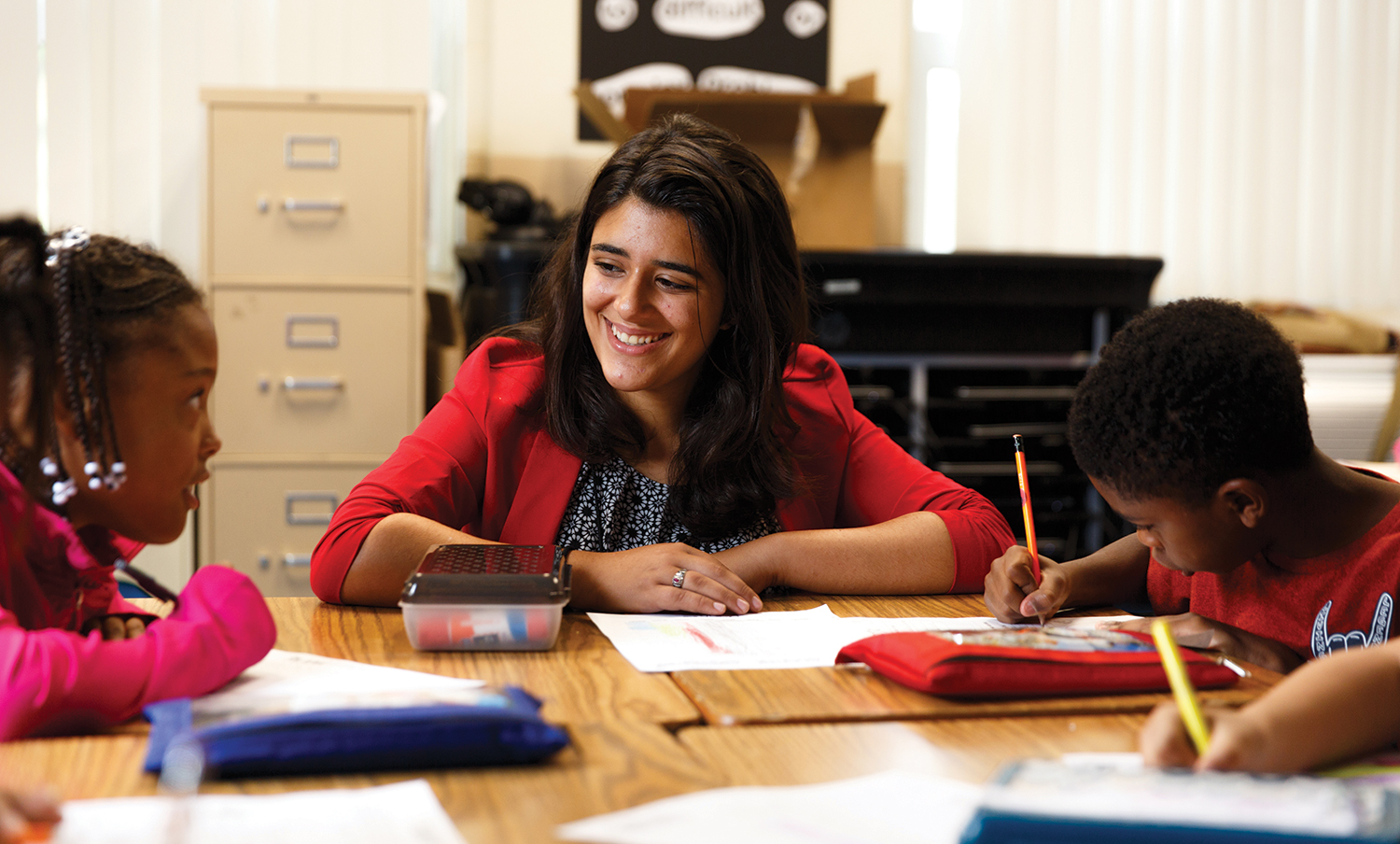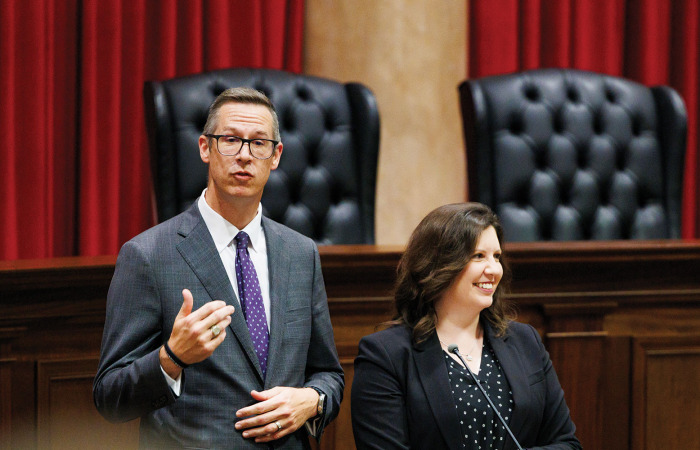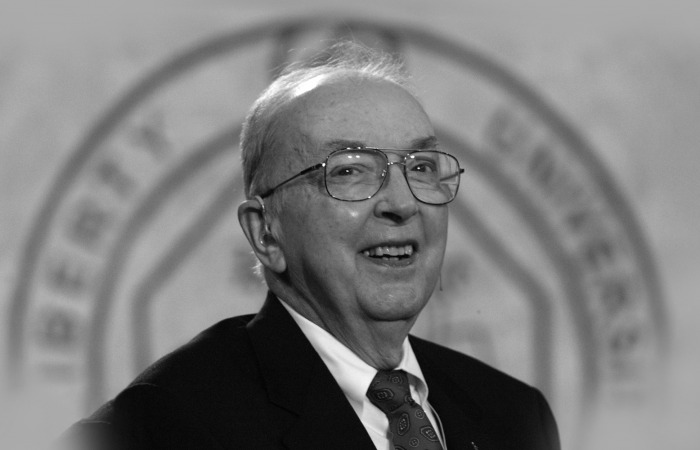Each story in this special feature section demonstrates a tenet of the “We The Champions” Declaration, part of a university-wide project that aims to tell the world how Liberty is fulfilling its mission of Training Champions for Christ.
We The Champions: Challenge Perspectives
Education students focus on the challenges affecting urban school systems
Working in an inner-city school is not the first choice for many teachers. They know that schools in more densely populated areas often underperform and lack the necessary resources or funding for teachers to do their jobs effectively. Many teachers get frustrated and leave within their first year of teaching, putting the profession near the top of national turnover rates.
Monica Huband, an assistant professor in Liberty University’s School of Education, said studies have shown that many students who attend school in high-poverty, urban environments can exhibit lower academic performance than their peers. Many may also carry with them a number of social issues that could affect their success in school.
“These issues are compounded by the large number of teachers who leave urban schools each year because they feel unprepared to work with this needy and underserviced population of students,” she said. “The schools and students in need of the most support are hindered by the lack of high-quality, veteran teachers who know how to effectively meet the needs of students with academic and behavioral challenges.”

Senior Itzel Nogueras is the president of LU’s Urban Education Club. Here, she interacts with students at Dearington Elementary School. (Photo by Joel Coleman)
In Lynchburg, where Liberty is located, 54 percent of students attending city schools have an economic disadvantage. Only 43.8 percent of schools in the district are fully accredited, meaning they have met the Commonwealth’s requirements on its Standards of Learning tests.* With low test scores, local schools have felt increasing pressure to ensure that, no matter their background, each student receives the best education they can provide.
After meeting with principals of nearby schools, where many of Liberty’s teacher candidates are completing their student-teacher assignments, and learning more about the challenges their teachers face, the School of Education wanted to do all it could to better prepare its students for urban settings.
“When we reviewed research on the socioeconomic achievement gap and high rates of teacher turnover in low-income, urban schools, we knew that we had to do something to address this issue in our local school systems,” Huband said.
Last fall, the school responded by launching the Urban Education Club. The club currently partners with four Lynchburg City elementary schools, one area middle school, and one high school. This fall, members are also working with Smart Beginnings Central Virginia, a regional initiative to connect leaders from school systems, community service ventures, businesses, and private agencies to make sure children are ready to enter kindergarten. Participation in the club’s activities is in addition to the students’ required student-teaching assignments.
“Going into the local community has been extremely beneficial for our club members, because it gives them an opportunity to apply what they have learned from readings and presentations to actual students and classrooms,” Huband said. “Club members are typically paired with veteran educators who provide a wealth of knowledge and experience on effective teaching in urban classrooms.”
The club was selected to receive a university ILLUMINATE grant for the 2017-18 school year, which helps cover the cost of guest speakers who discuss specific issues within urban education, as well as a spring trip for students to Washington, D.C.
Huband said the trip is a valuable experience, giving students the chance to tour schools and speak with administrators and veteran educators about the rewards and challenges of teaching in a large metropolitan environment.
“It provides a glimpse into a different type of urban community and encourages discussion about the similarities and differences between urban schools in Lynchburg and the schools we visit in Washington, D.C.”
Club members are also encouraged to pursue their student-teaching requirements in D.C. through Liberty’s Washington Fellowship Program, a semester-long internship program where Liberty students from all majors have the opportunity to work in the nation’s capital.
Liberty senior and club president Itzel Nogueras said the club has changed her perspective on urban schooling. Nogueras said that at first she had no desire to teach in that type of setting, but was persuaded by another member to join the club this past spring.
For her club teaching assignment, Nogueras was placed at Dearington Elementary School for Innovation in Lynchburg, working with first-graders. That experience gave her the passion to continue working in urban education.
“It gave me a new perspective,” Nogueras said. “I saw students who came from broken families, and my heart broke for them, so I wanted to stay.”
During a meeting with a local school administrator, she was asked what urban education means.
“We were able to present all the knowledge we learned from the classroom, from the speakers, and from our research to effectively answer his question. He was blown away by our answers and told us that many people are unable to answer this.”
Some of those answers, she said, included ways that teachers can prepare for class beyond having a lesson plan.
“Teachers need to consider the student’s home life and how that has an effect on their learning in so many ways,” she said. “Before teachers can start teaching, they need to ensure that the physiological needs are covered. If the students are hungry, thirsty, haven’t rested, or are injured, there is no way that they will be able to retain whatever is being taught that day.” She said teachers also must prepare by not only stocking their classrooms with the average school supplies, but also extra shirts, jackets, snacks, and toothbrushes.
But Nogueras said it’s more than just understanding the unique challenges of urban education; it’s about having a heart for the students they teach and taking action.
“The younger children are still so innocent despite their circumstances,” she said. “They just want to be loved. The older children have more of an idea — and you can see it affects them, which can be challenging. But when you’re consistent, they learn to trust you, and then they start listening to what you have to say.”
Nogueras said that while the club helped her to step out of her comfort zone, it is God who showed her that this is where she is supposed to be, working in her own mission field.
“Even though you can’t come out and say the name of Jesus directly sometimes, it’s still a ministry,” she said. “I get to show these kids Christ through my actions and by being a light to them.”
*Source: Virginia Department of Education
To be involved in the “We The Champions” project and read more inspiring stories from the Liberty community, visit Liberty.edu/Champions and follow #WeTheChampions on social media.




